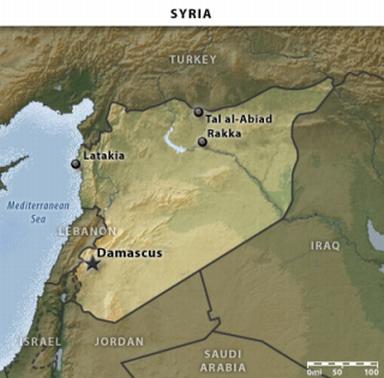The Syrian military's focus is on its borders with Israel and Lebanon, and its disposition reflects these priorities. Syria's air defense network is heaviest in the country's south and west. Major sites commonly identified with Syria's ballistic missile units and other significant military targets of interest to Israel are far closer to the coast than the area in which this incident reportedly occurred.
Israel could have been carrying out a reconnaissance mission to probe Syria's air defense network. Probing the network along the Turkish border -- especially 200 or more miles into northeastern Syria -- is likely of marginal value to the Israelis, however. A reconnaissance mission also could have been launched to detect militant training camps or arms-smuggling routes in the area, and could have been heading further east toward the Iraqi border before it was spotted.
The Syrians wasted no time in playing up the incident, with Information Minister Mohsen Bilal telling Al Jazeera in a television interview that "Syria retains the right to determine the quality, type and nature of our response to the Israeli attack." Even the Iranians have joined in the fray, with Iran's ambassador to Syria publicly assuring security officials in Syria that Tehran would be ready to offer Damascus any assistance it might need to respond to Israel's perceived act of aggression.
Israeli overflights into Syrian territory occur fairly regularly, most of which Damascus is embarrassingly slow in responding to. When Israel buzzed Syrian President Bashar al Assad's palace last summer off the coast of Latakia (flying so low the president's windows shattered), the IAF warplane had already flown out well beyond Syrian territory before a single shot was fired. In this latest incident, however, Syria's air defense tracked the warplane in time to cause the IAF aircraft to maneuver and drop extra weight to avoid risking getting shot down.
In Syria's mind, this definitely constitutes something worth bragging about.
This overflight safely can be assumed to be one of several IAF penetrations into Syria since the 2006 Israel-Hezbollah summer conflict, all of which Syria either was not able or willing to respond to. (Shooting at an IAF warplane is one thing, shooting it down and dealing with the response is another.) This raises two possibilities that are not necessarily mutually exclusive: One, the Syrians were able to track and engage the infiltrator(s), reflecting an apparent improvement in Syria's ability to integrate its communication and radar systems. Or two, Syrian decision-making has shifted to a more aggressive stance, with Damascus eager to remind Israel that its air defense system should no longer be held in such low esteem.
Syria closely studied the IAF's performance during the summer conflict, and has since built up its anti-aircraft systems with Russian assistance. With Israel already agitated over these defense sales and Moscow's ambitions to return its naval fleet to the Syrian coast, Israel's ongoing spat with Russia is bound to intensify.
But Syria's fueling of speculation over how exactly it plans to retaliate against Israel -- either diplomatically or militarily -- actually puts Damascus in a tight spot. A Syrian response is unlikely to take the form of a direct military confrontation with Israel. The Syrian government is well aware that the Israeli government is quite comfortable keeping the al Assad family in control of Damascus for purposes of regional stability. With Syria lacking a better, non-Islamist alternative to the al Assad clan, Israel has no interest in provoking a military conflict that would significantly threaten the government's hold on power.
The Syrians also are busy figuring out how to readjust their priorities now that the Iranian-U.S. negotiations over Iraq are waning, and the prospect of Washington giving Syria the time of day no longer looks as promising as it did just a few months ago. Syria's current focus is on how to reconsolidate its position as Lebanon's main powerbroker by getting its preferred candidate selected in Lebanon's upcoming presidential elections. With the bulk of the region's focus on a coming U.S. policy shift in Iraq, Syria is looking to take advantage of the distraction to secure its interests in Lebanon. The Syrians also are looking at how things are shaping up for their allies in Tehran, who are preparing an aggressive push to fill the power vacuum in Iraq once U.S. troops begin to drawdown. With the Iranians holding the upper hand, Syria will align itself more closely with Tehran and will use this alliance to bolster itself regionally.
But a boost of confidence in Syria will not necessarily translate into the Syrians working up enough chutzpah to challenge the Israelis militarily in the near future. Though Israel is still in the recovery stages from last year's summer conflict against Hezbollah, Israel Defense Forces (IDF) would not hesitate to respond with full force against a direct Syrian provocation. Damascus may rely on its militant proxies -- such as Hamas, Palestinian Islamic Jihad or even Hezbollah -- to pressure Israel, but even these groups are preoccupied enough with internal matters that they would need to think twice about getting into a major brawl with the IDF at this point in time.So though the Syrians have talked up this incident to portray themselves as the victim of Israeli aggression, Damascus' response is unlikely to go much beyond rhetoric.
